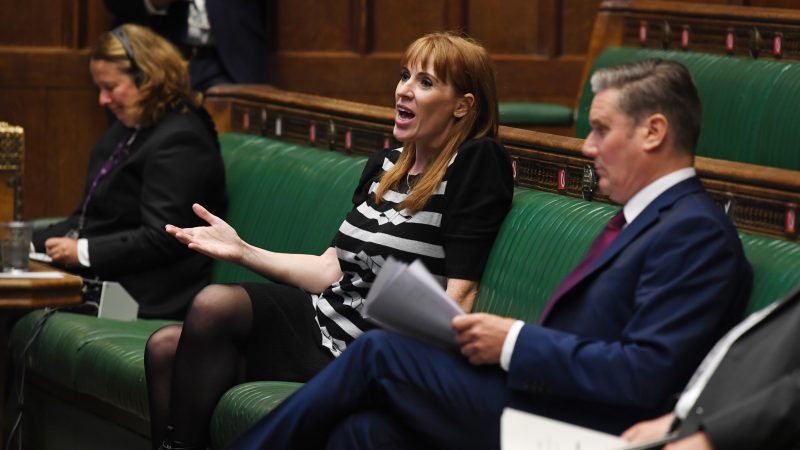
Good morning. Angela Rayner has pledged this morning that Labour will “clean up politics”, reiterating the party’s plans to create an independent ethics and integrity commission to restore standards. Speaking at the Institute for Government, the deputy Labour leader outlined how the party would go about setting up the new commission, which would replace both the advisory committee on business appointments (ACOBA) and the independent adviser on ministers’ interests. During the speech, Rayner attacked the “theory of good chaps” in the context of successive cases of Tory sleaze, singling out Boris Johnson but also laying considerable blame at Rishi Sunak’s door, declaring that the “rot starts at the top”. She told attendees: “Never again will a Prime Minister and ministers be able to break the rules with impunity because the rules are too weak.” According to the Guardian, Labour’s proposals would see ministers banned from taking lobbying jobs related to their former brief for up to five years, with fines for breaches of the rules.
Meanwhile, campaign groups and others have been reacting to the leaked list of amendments to Labour’s draft policy programme, published by LabourList yesterday. The Labour Campaign for Free Movement welcomed the party’s commitment to scrapping the Rwanda deportation scheme but argued that the party “must push back harder against the Tories’ anti-migrant agenda, much of which is still left unchallenged by the leadership”. Momentum co-chair Kate Dove said representatives backed by the group will “loudly make the case” for amendments not recommended so far, including renationalisation beyond rail, universal free school meals and wealth taxes at the NPF meeting later this month. The Socialist Health Association expressed surprise at the suggestion integrated care systems should be “empowered to act as a bulwark against privatisation”, arguing that that “disregards that they were designed precisely to embed transnational corporations in the commissioning and provision of NHS services”. Meanwhile, a spokesperson for Labour for a New Democracy highlighted widespread support within the party for electoral reform, declaring: “We expect the decisions of the NPF to reflect this.”
In breaking union news, the High Court has today ruled that changes to regulations to allow the use of agency workers to cover official industrial action are unlawful, following a legal challenge brought by trade unions and coordinated by the TUC. TUC general secretary Paul Nowak described the ruling as a “badge of shame for the Conservatives”, while Unite general secretary Sharon Graham said it was a “total vindication for unions and workers”. Elsewhere, members of the teaching union NASUWT have voted for walkouts over pay, with the union saying it would now consider going on strike in the autumn term. The announcement came ahead of an expected meeting between Sunak and Chancellor Jeremy Hunt this morning to decide whether to accept recommendations by eight pay review bodies.
Also today, junior doctors begin their longest walkout yet over pay, taking part in a five-day strike ending on Tuesday. The first day of the strike coincides with the release of the latest data on NHS waiting times, which estimates that 7.47 million people in England were waiting to start hospital treatment at the end of May – the highest total since records began. According to the Guardian, NHS England has warned ministers that it will not be possible to meet the Prime Minister’s pledge to reduce waiting lists if walkouts continue beyond the summer. But the latest data is a further indication of the extreme pressure healthcare staff are under, which has contributed significantly towards the decision to take strike action. Shadow Health Secretary Wes Streeting toed a careful line in his response to the data, noting the impact of strikes on waiting times but arguing that the fault lies with Sunak given “his refusal to negotiate”. Both sides have expressed a desire to return to the negotiating table, but the government has said the BMA must first “move significantly” from its current pay demands and call off strikes. The doctors’ union has rejected the latter precondition as “nonsensical”.
In Wales, first minister Mark Drakeford’s decision not to keep extending free school meals provision into the holidays has sparked controversy, with not only opposition parties but also some Labour figures speaking out. Mike Hedges, MS for Swansea East, said feeding poor children “has to be a priority”, according to the BBC.
Elsewhere, Progressive Britain publishes an interesting report today on “perhaps the most important – though often under-appreciated – tool” that a Labour government has – regulation. It argues problems from the Grenfell tragedy to Thames Water’s troubles to the collapse of Bulb “have their roots” in flawed regulation and the public support high standards over free-market views. Proposals include getting regulators to draft action plans to deliver Labour’s five missions and expecting reform and improvement before services get significant extra funding – something likely to go down well with the shadow Treasury team but like cold sick with the Labour left.
And finally, we’re lucky to have not one but two shadow frontbenchers writing for us, with Justin Madders on Labour’s new deal for working people and Louise Haigh on her by-election bus tour.
This is an online version of LabourList’s daily newsletter, which hits the inboxes of more than 35,000 Labour members, MPs, councillors, staff and others interested in reading the most comprehensive, independent briefing in town on Labour news, analysis and debate.
Sign up to LabourList’s morning email for everything Labour, every weekday morning.



More from LabourList
MPs, union leaders and organisations react to ‘bruising’ Gorton and Denton result
A gory night for Labour
‘SEND reforms are a crucial test of the opportunity mission’